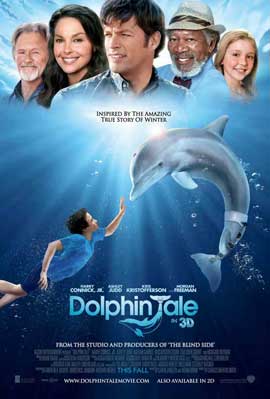One thing I've noticed since becoming a teacher is that just about everywhere I look, I see things that make me think about how I teach, my students, or education in general. Sometimes these flickers of thought are inspired by the kinds of things you would expect- an article about education, an advertisement on the radio about increasing graduation rates, etc.- but sometimes, the spark comes from an unexpected place. I had this kind of experience yesterday. I was at my brother's house, and he put the movie Dolphin Tale in for our kids to watch. I had heard of the movie, and it is currently on my waiting list with Netflix, but I figured it was a movie my kids would enjoy, but that I would find fairly boring. I was wrong.

photo courtesy of www.moviepostershop.com
While the movie has a very heartwarming message about helping others and the power of hope, that is not what made the movie worthwhile for me. The thing that caught my attention is the role education played in the film. Here's the rundown:
The main character, Sawyer, is a very introverted kid. He doesn't have many, if any, friends, and we learn that he fails pretty much every subject in school. As teachers, we all know kids like Sawyer. For Sawyer, school just doesn't seem to click for him. This is not to say that he isn't intelligent. Early in the movie, we find that he has his own little workshop in the garage where he repairs the remote-controlled helicopters he likes to fly as a hobby, as skill many of us would probably have a difficult time mastering. As the movie unfolds, it is revealed that Sawyer must attend summer school to get credit for the classes he failed. It is while he is on his way to summer school that things begin to happen. Sawyer is riding along the beach when a fisherman yells at him for help. A dolphin has washed up on shore and is caught in the rope from a crab box. Sawyer stays with the dolphin until a marine life rescue unit can come take the dolphin away, during which time he cuts the rope and apparently forms a bond with the animal.
After school, Sawyer goes to check on the dolphin and ends up making friends with the people at the marine hospital. Long story short (too late, I know), Sawyer ends up skipping school (where he was learning about prepositions in a way that makes me, an English teacher who does still teach grammar, want to run out screaming) to spend time working with the dolphin on her recovery. While there, he begins learning about the biology of all of the animals in the center and how to care for them. As an audience, we don't even realize he is learning because it just looks like a kid enjoying what he is doing and the people he is doing it with, but when he bring his mother to center, and she sees her chronic F student giving her an expert tour of the facility and interacting with everyone there instead of quietly sitting in the corner, she realizes what we need to realize as educators- learning is more genuine and more real when it applies to real things. She lobbies the summer school teacher to excuse Sawyer from the rest of the class so he can continue his work at the center, offering to have him write a report to receive credit for the course. The teacher, dumbly in my opinion, refuses. Sawyer continues his work and writes the report anyway. In the end, after seeing how much Sawyer accomplished when he wasn't chained to a desk, the teacher, wisely in my opinion, decides to give Sawyer credit.
The message here- We, as educators, need to be paying attention to our students to see if we have any Sawyers in our midst. I, for one, have made an real effort to start including more project-based learning into my classroom, and I began a project with one of my senior-level classes last year, which I am continuing this year, that requires them to work with a mentor in the community to learn more about their intended career and work with that person to create a project/product that gives them real-world experience in that field, but that isn't enough. I need to open my eyes and ears to find out if there are any kids in my classes that are doing amazing things on their own and figure out a way to tap that enthusiasm and let them bring it to my classroom. So, to any students who may be reading this (for extra credit, which just makes the whole thing feel tainted), do you have a passion for some kind of learning that you aren't getting in school? Are you like Sawyer in any way? To any teachers who may be reading this, do you have any success stories of helping a kid like Sawyer by plugging into their passion, even when it didn't fit your curriculum? Do you have any stories of missed opportunities to do this? How can use what happened in this movie as an inspiration to allow our students the freedom to really learn while still meeting all of our accountability requirements? The challenge is large, but all of the really worthwhile in challenges in life generally are. I look forward to hearing from you.